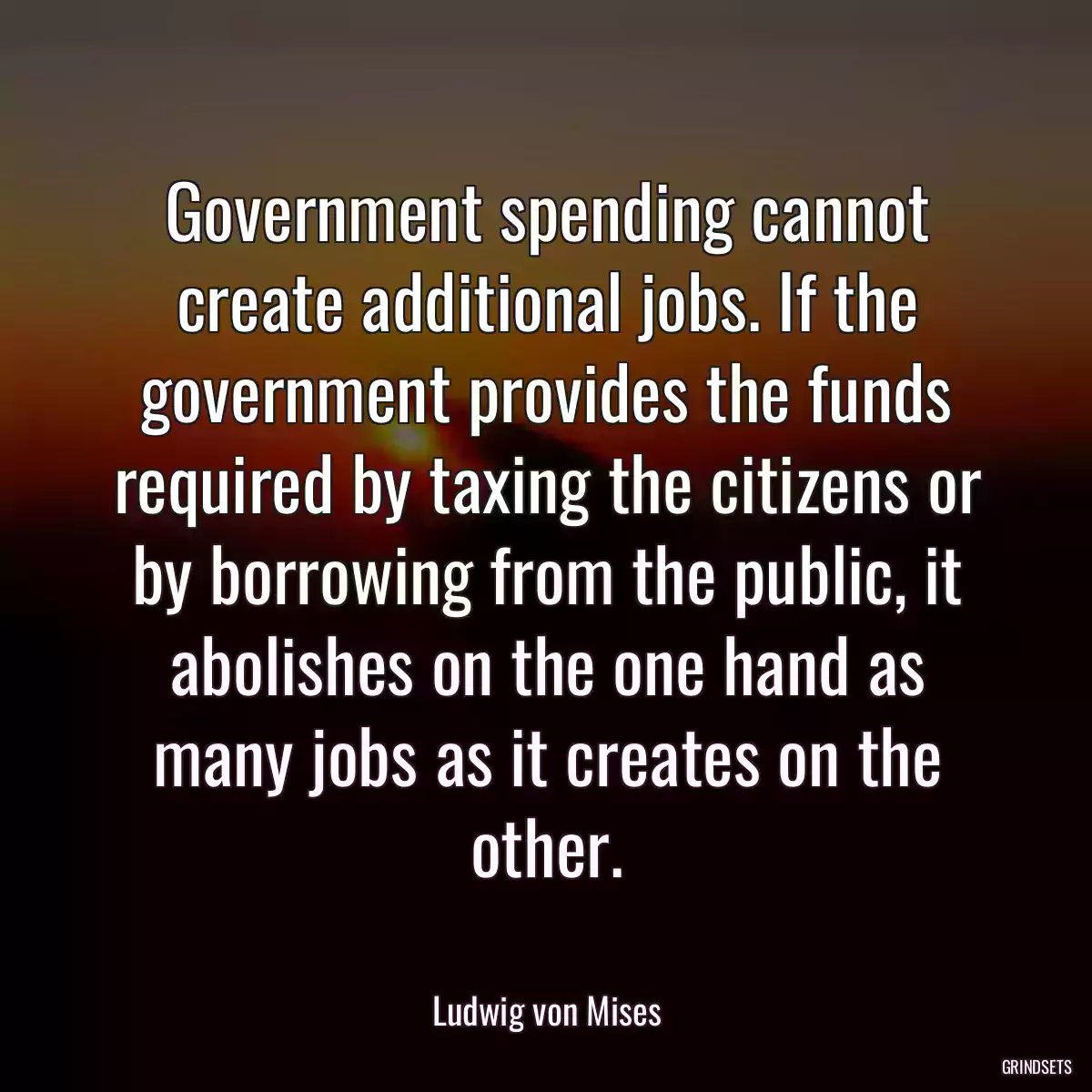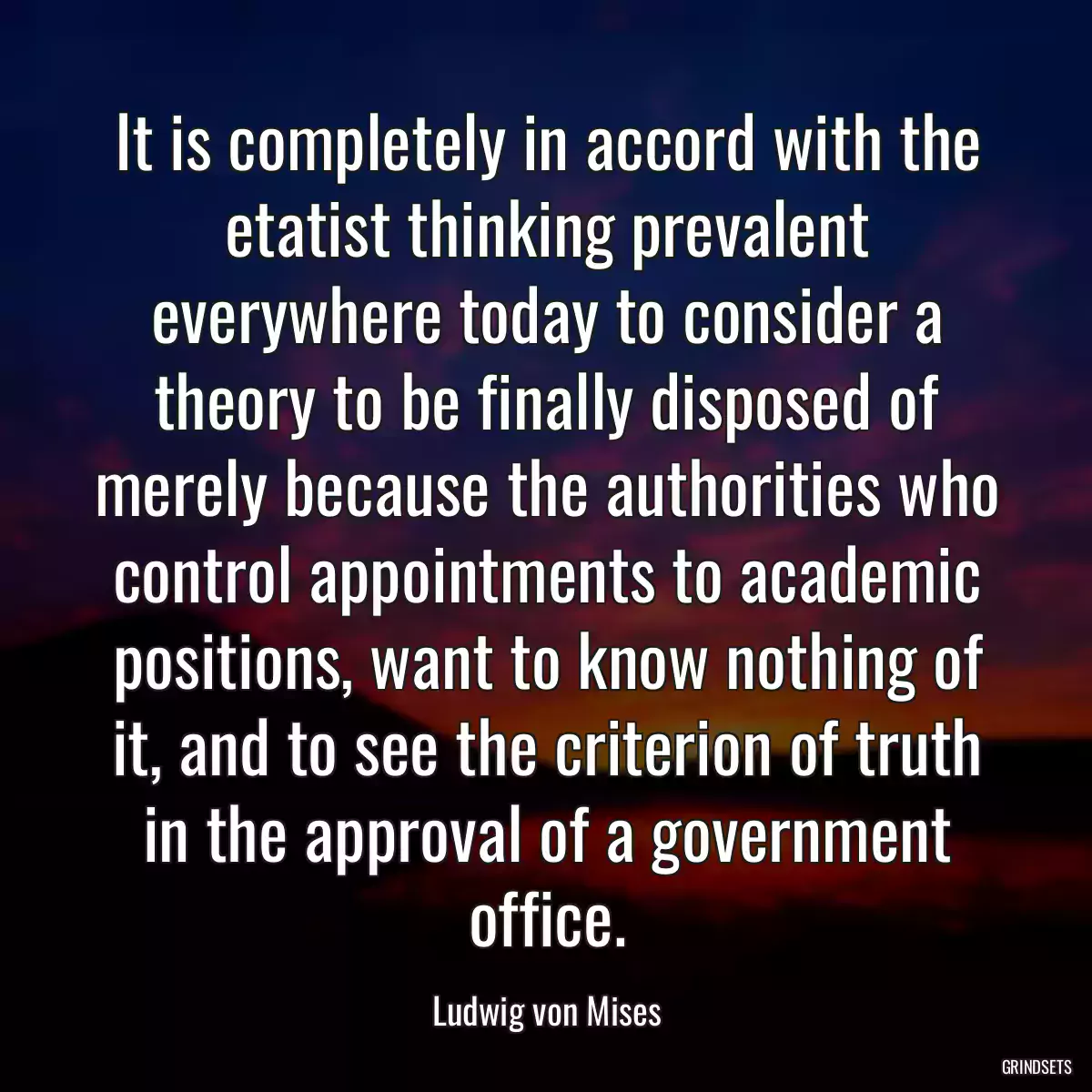
Quotes Ludwig von Mises - page 2
Find dozens of Ludwig von Mises with images to copy and share.

These people talk of a "middle-of-the-road" policy. What they do not see is that the isolated interference, which means the interference with only one small part of the economic system, brings about a situation which the government itself — and the people who are asking for government interference — find worse than the conditions they wish to abolish: the people who are asking for rent control are very angry when they discover there is a shortage of apartments and a shortage of housing.
An intellectual inferiority of the masses would manifest itself most evidently in their aiming at the abolition of the system in which they themselves are supreme and are served by the elite of the most talented men.
Suggestion of the Communist Manifesto was 'abolition of all right of inheritance.' Looking backward upon the past history of estate taxes, we have to realize that they more and more have approached the goal set by Marx. Estate taxes of the height they have already attained for the upper brackets are no longer to be qualified as taxes. They are measures of expropriation.
You may also like
In the socialist commonwealth every economic change becomes an undertaking whose success can be neither appraised in advance nor later retrospectively determined. There is only groping in the dark. Socialism is the abolition of rational economy.
The idea that political freedom can be preserved in the absence of economic freedom, and vice versa, is an illusion. Political freedom is the corollary of economic freedom.
The so-called liberals of today have the very popular idea that freedom of speech, of thought, of the press, freedom of religion, freedom from imprisonment without trial-that all these freedoms can be preserved in the absence of what is called economic freedom. They do not realize that, in a system where there is no market, where the government directs everything, all those other freedoms are illusory, even if they are made into laws and written up in constitutions.
You know that the population is of this planet is now ten times greater than it was in the ages preceding capitalism.; you know that all men today enjoy a higher standard of living than your ancestors did before the age of capitalism. But how do you know that you are the one out of ten who would have lived in the absence of capitalism? The mere fact that you are living today is proof that capitalism has succeeded, whether or not you consider your own life very valuable.
The riches of successful entrepreneurs is not the cause of anybody's poverty; it is the consequence of the fact that the consumers are better supplied than they would have been in the absence of the entrepreneur's efforts.

It is true that some secluded intellectuals in their esoteric circles talk differently. They proclaim the priority of what they call eternal absolute values and feign in their declamations—not in their personal conduct—a disdain of things secular and transitory. But the public ignores such utterances. The main goal of present-day political action is to secure for the respective pressure group memberships the highest material well-being. The only way for a leader to succeed is to instill in people the conviction that his program best serves the attainment of this goal.
Only stilted pedants can conceive the idea that there are absolute norms to tell what is beautiful and what is not. They try to derive from the works of the past a code of rules with which, as they fancy, the writers and artists of the future should comply. But the genius does not cooperate with the pundit.
The real bosses, in the capitalist system of market economy, are the consumers.
To assign to everybody his proper place in society is the task of the consumers. Their buying and abstention from buying is instrumental in determining each individual's social position.
Capital is not a free gift of God or of nature. It is the outcome of a provident restriction of consumption on the part of man. It is created and increased by saving and maintained by the abstention from dissaving.
The common man is the sovereign consumer whose buying or abstention from buying ultimately determines what should be produced and in what quantity and quality.
The real bosses in the capitalist system of market economy are the consumers. They by their buying and by their abstention from buying decide who should own the capital and run the plants. They determine what should be produced and in what quantity and quality. Their attitudes result either in profit or in loss for the enterpriser. They make poor men rich and rich men poor. They are no easy bosses.
The government pretends to be endowed with the mystical power to accord favors out of an inexhaustible horn of plenty. It is both omniscient and omnipotent. It can by a magic wand create happiness and abundance. The truth is the government cannot give if it does not take from somebody.
You may also like

It is completely in accord with the etatist thinking prevalent everywhere today to consider a theory to be finally disposed of merely because the authorities who control appointments to academic positions, want to know nothing of it, and to see the criterion of truth in the approval of a government office.
There is but one means available to improve the material conditions of mankind: to accelerate the growth of capital accumulated as against the growth in population. The greater the amount of capital invested per head of the worker, the more and better goods can be produced and consumed. This is what capitalism, the much abused profit system, has brought about and brings about daily anew. Yet, most present-day governments and political parties are eager to destroy this system.